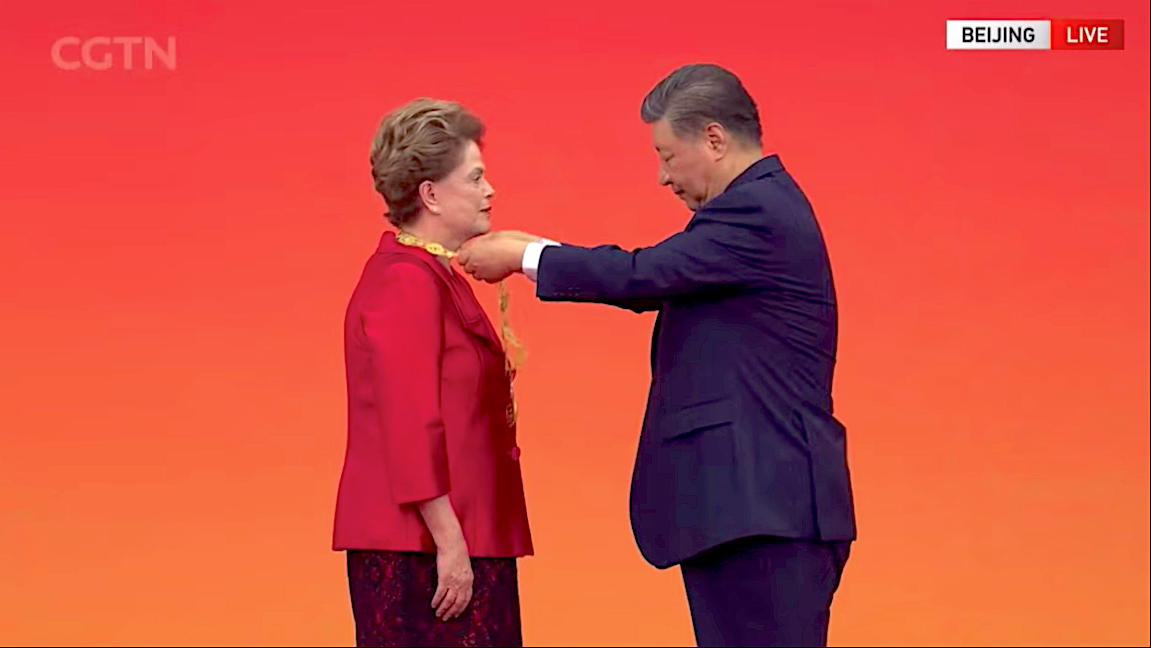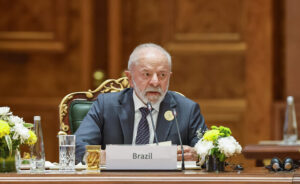
Published 10/10/2024 17:03 | Edited 10/10/2024 17:36
Former president Dilma Rousseff, current president of the New Development Bank (NDB), also known as the Brics Bank, shared her vision about the opportunities and challenges that Brazil and the world face in a press conference held at the State Guest House , Diaoyutai, in Beijing, China. In the interview published by Brazil in factDilma highlighted central themes such as Brazil’s possible adherence to the Belt and Road Initiative, the role of the NDB, the use of local currencies in international transactions, as well as reflections on the growth of the extreme right in the world.
The interview took place on September 29, specifically for the Brazilian press present, shortly after Dilma received the Medal of Friendship, the highest honor granted by China, a recognition for her contribution to strengthening relations between Brazil and China. Dilma, who is expected to leave her position at the bank in July 2025, offered a comprehensive analysis of global economic issues and Brazil’s position amid these dynamics.
New Silk Road: a strategic opportunity for Brazil
Dilma emphasized the importance of Brazil exploring the opportunities of the New Silk Road, a Chinese initiative that aims to improve global infrastructure and promote economic cooperation between countries. With investments of more than US$1 trillion over the last 10 years, the Initiative offers partnerships in key sectors such as infrastructure, technology and industrialization.
The Belt and Road Initiative is an international cooperation megaproject promoted by China. Dilma highlighted that Brazil should seek a strategic partnership in this initiative, which has already generated trillions of dollars in infrastructure projects, such as highways, ports and airports. According to the former president, Brazil should not miss the chance to take advantage of the possibilities offered by the initiative, especially with regard to industrialization and technology transfer.
According to the former president, Brazil can take advantage of this international cooperation by seeking to create industrial and technological parks, with technology transfer and support for sectors such as food security and sustainable development. Dilma emphasizes that the New Silk Road does not require exclusivity, allowing Brazil to maintain other simultaneous partnerships. “Brazil has to take advantage of all the opportunities that appear to it”, he stated.
The former president sees the initiative as a way to overcome the old international division of labor, which relegated developing countries to the role of commodity producers, while developed nations manufactured products with greater added value.
The role of the NDB and dedollarization
At the head of the NDB, Dilma detailed the bank’s priorities for the coming years, with an emphasis on sustainable infrastructure projects and the increasing use of local currencies in transactions. The proposal for de-dollarization, that is, the diversification of currencies used in international negotiations, was approached as a way to reduce dependence on the dollar and reduce the impacts of variations in US monetary policies.
The NDB has already started financing projects in local currencies, such as the use of the rand in South Africa and pandabonds in China. For Dilma, this practice will become increasingly common among the bank’s member countries, directly benefiting the private sector. The former president predicts that the NDB will continue to expand its operations and incorporate new members, such as Algeria, which recently joined the institution.
Combating climate change and technology transfer
Another crucial point discussed was the NDB’s commitment to sustainable development. Dilma mentioned investment in renewable energy, such as wind and solar, as well as innovative projects, such as the high-capacity biodigester that transforms organic waste into fertilizers, the result of a partnership between Chinese and Brazilian universities. This approach aims not only to combat climate change, but also to help emerging countries achieve greater technological autonomy.
Technology transfer was highlighted as one of the pillars for Brazil and other countries in the Global South to reach a new level of industrial development. Dilma defended the importance of investments in education and science, citing the Science Without Borders program as an example of a previous effort to expand technical training in Brazil.
Growth of the extreme right and the risks of anti-communism
Dilma also reflected on the advance of the extreme right in the world, warning of the danger of speeches based on anti-communism and the Cold War. For Dilma, Brazil should not fall into these ideological traps, but rather seek its own path that respects the lessons of history and promotes inclusive development according to its needs. She praised China for its ability to continuously learn and adapt, highlighting the value of education as one of the pillars of the country’s success.
When comparing with the United States, Dilma mentioned how the far right has fostered a “zero-sum” vision, where the advancement of one group is seen as a loss for the other, creating harmful social divisions. For her, building a shared future, as proposed by Chinese President Xi Jinping, should be a global goal.
Rousseff ended the interview with an optimistic view of Brazil’s future, believing that the country has the potential to reindustrialize and become a protagonist in the Fourth Industrial Revolution, as long as it takes advantage of opportunities for international cooperation. For her, Brazil needs to be open to technology transfer and invest in education, as a way to overcome development challenges.
Dilma Rousseff’s interview offers a clear vision of the role that Brazil can play on the international stage, while highlighting the importance of South-South cooperation and the diversification of global partnerships. With a pragmatic approach, Dilma highlighted the need for investments in technology, sustainability and education, themes that she considers central to the country’s future.
Dilma Rousseff is expected to step down as head of the NDB in July 2025, but her vision on the importance of international cooperation and strengthening emerging economies leaves a significant legacy.
Source: vermelho.org.br

